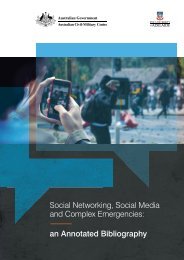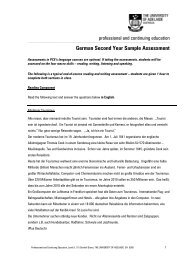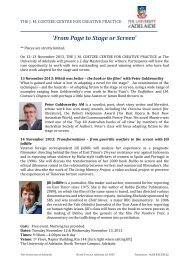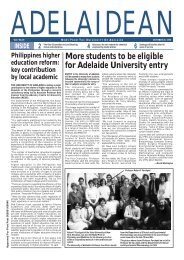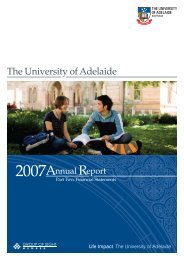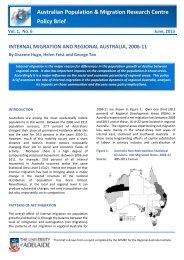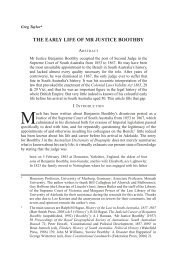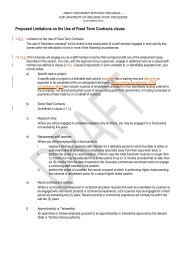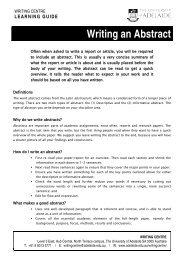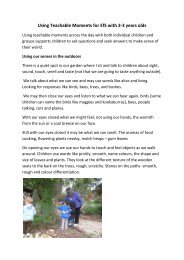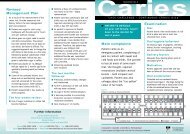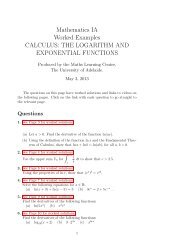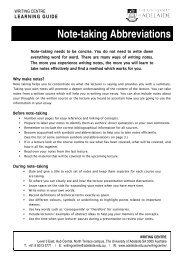Unbridling the Tongues of Women - The University of Adelaide
Unbridling the Tongues of Women - The University of Adelaide
Unbridling the Tongues of Women - The University of Adelaide
You also want an ePaper? Increase the reach of your titles
YUMPU automatically turns print PDFs into web optimized ePapers that Google loves.
<strong>Unbridling</strong> <strong>the</strong> tongues <strong>of</strong> women<br />
written by women’. By <strong>the</strong> 1860s, John Stuart Mill could reflect that ‘If women<br />
lived in a different country from men, and had never read any <strong>of</strong> <strong>the</strong>ir writings,<br />
<strong>the</strong>y would have a literature <strong>of</strong> <strong>the</strong>ir own’. 3 Spence may well have formulated her<br />
childhood’s ambition ‘to be a teacher first, and a great writer afterwards’ before she<br />
knew anything <strong>of</strong> <strong>the</strong> women who had written fiction before her. But at about <strong>the</strong><br />
time that she first had a novel published she began to look to o<strong>the</strong>r writers who were<br />
women. She ‘read and appreciated Jane Austen’s novels – those exquisite miniatures’;<br />
towards <strong>the</strong> end <strong>of</strong> her life she observed, ‘so great a charm have Jane Austen’s books<br />
that I have made a practice <strong>of</strong> reading <strong>the</strong>m through regularly once a year’. 4 She<br />
thought highly <strong>of</strong> <strong>the</strong> poems <strong>of</strong> Elizabeth Barrett Browning. 5 She wrote and spoke<br />
<strong>of</strong> George Eliot and her admiration for her work, wondering at one time how Eliot<br />
would have fared had she, like Spence, come to live in an Australian colony. 6 She regarded<br />
<strong>the</strong> ‘poems and economic writings’ <strong>of</strong> Charlotte Perkins Gilman as an ‘inspiration’.<br />
7 She saw her own life as similar to that <strong>of</strong> Margaret Oliphant, whose fiction<br />
she liked. 8 In her later years she reviewed novels written by younger women as different<br />
as her sister colonist Ca<strong>the</strong>rine Martin and <strong>the</strong> South African Olive Schreiner. 9<br />
And she decided that she disliked <strong>the</strong> Australian Barbara Baynton’s Bush Studies even<br />
more than she had disliked meeting <strong>the</strong> book’s author. 10 If <strong>the</strong> novel was ‘<strong>the</strong> line <strong>of</strong><br />
least resistance’, <strong>the</strong>n it was because Spence could draw support and encouragement<br />
from knowing and approving <strong>the</strong> work <strong>of</strong> o<strong>the</strong>r women who, in <strong>the</strong> cosmopolitan<br />
world <strong>of</strong> letters, were subverting <strong>the</strong> patriarchal dominion over culture by creating a<br />
literature <strong>of</strong> <strong>the</strong>ir own.<br />
However, even <strong>the</strong> mediated indirect public voice that women could find through<br />
fiction was still contested in <strong>the</strong> mid-19 th century. <strong>The</strong> Poet Laureate, Robert Sou<strong>the</strong>y,<br />
had told Charlotte Brontë that ‘Literature cannot be <strong>the</strong> business <strong>of</strong> women’s life<br />
and it ought not to be’. 11 <strong>The</strong> Brontës published under masculine pseudonyms, and<br />
we still know George Sand and George Eliot by <strong>the</strong>irs. And that was in Britain and<br />
France. If <strong>the</strong> works which achieved print are any guide, <strong>the</strong>re were no more than<br />
four women attempting to write novels in all <strong>of</strong> colonial Australia at that time. 12 In<br />
one <strong>of</strong> <strong>the</strong> rawest <strong>of</strong> its outposts, Ca<strong>the</strong>rine Spence must have felt entirely alone.<br />
She began her first novel when she was 19 and was working as a governess, but<br />
she never finished it. ‘My bro<strong>the</strong>r’s insistence on reading it every day as I wrote it’<br />
she remembered ‘somehow made me see what poor stuff it was, and I did not go far<br />
with it’. 13 Eight years later, she had given up teaching, had gained some experience in<br />
journalism with occasional, anonymous contributions to <strong>the</strong> press, and had learned<br />
44



